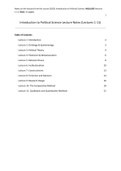Notes on the lectures from the course (2022) Introduction to Political Science. INCLUDES lectures
1-11 (Total: 23 pages).
1
Introduction to Political Science Lecture Notes (Lectures 1-11)
Table of Contents
Lecture 1: Introduction 2
Lecture 2: Ontology & Epistemology 3
Lecture 3: Political Theory 4
Lecture 4: Positivism & Behaviouralism 6
Lecture 5: Rational Choice 8
Lecture 6: Institutionalism 10
Lecture 7: Constructivism 13
Lecture 8: Feminism and Marxism 14
Lecture 9: Research Design 16
Lecture 10: The Comparative Method 18
Lecture 11: Qualitative and Quantitative Methods 21
, 2
Lecture 1: Introduction
What is political science?
Timeline:
● Ancient Greece:
○ Plato (political thought/philosophy) → normative (what ought to be).
○ Aristotle (systematic empirical observation) → empirical (what is).
● Renaissance/enlightenment/scientific revolution.
● Modern-day political science → research areas = comparative (state creation), international
(state interactions), transnational (border movement), globalisation (beyond the ‘West’),
waves of democratisation (study of citizens).
Political Science (theoretical approach): Determines research questions, design, conceptualisation.
➔ Conceptualisation: Determined (to a large extent) by theoretical perspective.
◆ To conduct science (study, analyse) = to compare.
◆ To compare = need points of reference (concepts).
Politics: The constrained use of social power, enabling collective choice and action, without simple
resort to (but NOT excluding) force/violence.
➔ Politics varies (enables/constraints, intended/unintended consequences, active/passive).
➔ Most political scientists focus on collective/public elements of power struggles.
➔ Abstract generalisations can be made about politics (ontological question) and what
constitutes political science.
◆ HOWEVER, the further the abstractions go the less they can be used.
Conceptualising politics:
1. Arena: Focuses on formal government institutions 2. Process: Politics is inscribed in all social
and actors within and/or who seek to influence it processes.
(mainstream political world). ➔ Constructivism, feminism,
➔ (Neo-)institutionalism, feminism, marxism. Marxism.
➔ Limitations = narrow, risks omitting ➔ Limitations = broad, risks
structures/actors. “conceptual overstretching”.
What is political science?
➔ Minimalist approach = ordered knowledge based on systematic enquiry.
➔ “What can we know?” (ontology)
➔ “How can we know it?” (epistemology)
, 3
Lecture 2: Ontology & Epistemology
Ontology
Ontology: Study of “what is” (theories of being/existence) → determines chosen epistemology.
➔ Ontological questions (abstract, philosophical, specific) include:
◆ “What is the nature of reality?”
◆ “What ‘really’ exists?”
◆ “Is there a world ‘out there’ independent of our experiences?”
➔ Social Ontology: Questions concerning the nature of social entities, whether they can and
should be considered.
➔ Two broad ontological positions:
1. Foundationalism (Objectivism/Realism) 2. Anti-Foundationalism (Constructivism/Relativism)
➔ Objective entities, with a reality ➔ Social construction built from the
external to social actors. perceptions/actions of social actors
➔ Discrete objects which possess ➔ Realities = local/specific varying between
properties independent of the individuals/groups (based on perspective).
observer. ◆ Actively constructed (NOT discovered).
➔ A real world exists independently of ➔ IMPORTANT: There is a ‘real world’, BUT that this
our knowledge of it. ‘real world’ does NOT matter (NO causal power
➔ Causality = independently of the on social action independent of people’s
observer. understanding of it).
Epistemology
Epistemology: Study of what we can know (epistemologies = theories of knowledge).
➔ Epistemological questions (abstract, specific) include:
◆ “What is knowledge?”
◆ “How do we gain knowledge of the world?”
◆ “Are there boundaries to what we can know?”
➔ Approaches:






